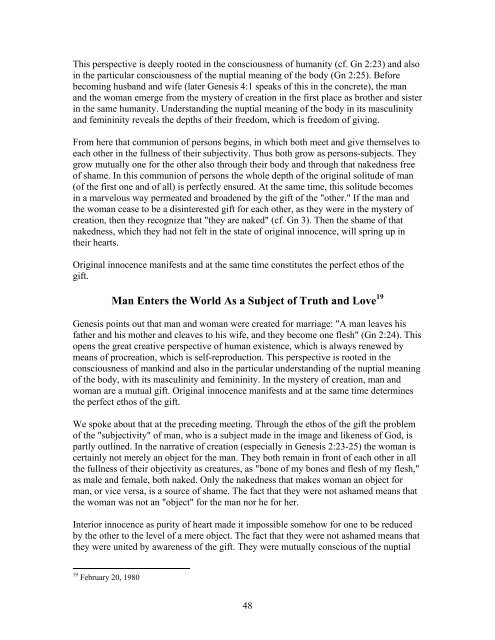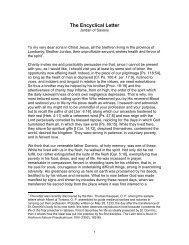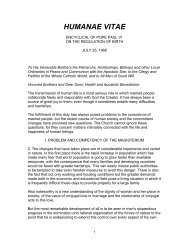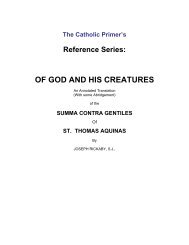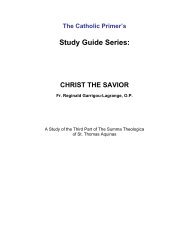The Theology of the Body by John Paul II - The Catholic Primer
The Theology of the Body by John Paul II - The Catholic Primer
The Theology of the Body by John Paul II - The Catholic Primer
Create successful ePaper yourself
Turn your PDF publications into a flip-book with our unique Google optimized e-Paper software.
This perspective is deeply rooted in <strong>the</strong> consciousness <strong>of</strong> humanity (cf. Gn 2:23) and also<br />
in <strong>the</strong> particular consciousness <strong>of</strong> <strong>the</strong> nuptial meaning <strong>of</strong> <strong>the</strong> body (Gn 2:25). Before<br />
becoming husband and wife (later Genesis 4:1 speaks <strong>of</strong> this in <strong>the</strong> concrete), <strong>the</strong> man<br />
and <strong>the</strong> woman emerge from <strong>the</strong> mystery <strong>of</strong> creation in <strong>the</strong> first place as bro<strong>the</strong>r and sister<br />
in <strong>the</strong> same humanity. Understanding <strong>the</strong> nuptial meaning <strong>of</strong> <strong>the</strong> body in its masculinity<br />
and femininity reveals <strong>the</strong> depths <strong>of</strong> <strong>the</strong>ir freedom, which is freedom <strong>of</strong> giving.<br />
From here that communion <strong>of</strong> persons begins, in which both meet and give <strong>the</strong>mselves to<br />
each o<strong>the</strong>r in <strong>the</strong> fullness <strong>of</strong> <strong>the</strong>ir subjectivity. Thus both grow as persons-subjects. <strong>The</strong>y<br />
grow mutually one for <strong>the</strong> o<strong>the</strong>r also through <strong>the</strong>ir body and through that nakedness free<br />
<strong>of</strong> shame. In this communion <strong>of</strong> persons <strong>the</strong> whole depth <strong>of</strong> <strong>the</strong> original solitude <strong>of</strong> man<br />
(<strong>of</strong> <strong>the</strong> first one and <strong>of</strong> all) is perfectly ensured. At <strong>the</strong> same time, this solitude becomes<br />
in a marvelous way permeated and broadened <strong>by</strong> <strong>the</strong> gift <strong>of</strong> <strong>the</strong> "o<strong>the</strong>r." If <strong>the</strong> man and<br />
<strong>the</strong> woman cease to be a disinterested gift for each o<strong>the</strong>r, as <strong>the</strong>y were in <strong>the</strong> mystery <strong>of</strong><br />
creation, <strong>the</strong>n <strong>the</strong>y recognize that "<strong>the</strong>y are naked" (cf. Gn 3). <strong>The</strong>n <strong>the</strong> shame <strong>of</strong> that<br />
nakedness, which <strong>the</strong>y had not felt in <strong>the</strong> state <strong>of</strong> original innocence, will spring up in<br />
<strong>the</strong>ir hearts.<br />
Original innocence manifests and at <strong>the</strong> same time constitutes <strong>the</strong> perfect ethos <strong>of</strong> <strong>the</strong><br />
gift.<br />
Man Enters <strong>the</strong> World As a Subject <strong>of</strong> Truth and Love 19<br />
Genesis points out that man and woman were created for marriage: "A man leaves his<br />
fa<strong>the</strong>r and his mo<strong>the</strong>r and cleaves to his wife, and <strong>the</strong>y become one flesh" (Gn 2:24). This<br />
opens <strong>the</strong> great creative perspective <strong>of</strong> human existence, which is always renewed <strong>by</strong><br />
means <strong>of</strong> procreation, which is self-reproduction. This perspective is rooted in <strong>the</strong><br />
consciousness <strong>of</strong> mankind and also in <strong>the</strong> particular understanding <strong>of</strong> <strong>the</strong> nuptial meaning<br />
<strong>of</strong> <strong>the</strong> body, with its masculinity and femininity. In <strong>the</strong> mystery <strong>of</strong> creation, man and<br />
woman are a mutual gift. Original innocence manifests and at <strong>the</strong> same time determines<br />
<strong>the</strong> perfect ethos <strong>of</strong> <strong>the</strong> gift.<br />
We spoke about that at <strong>the</strong> preceding meeting. Through <strong>the</strong> ethos <strong>of</strong> <strong>the</strong> gift <strong>the</strong> problem<br />
<strong>of</strong> <strong>the</strong> "subjectivity" <strong>of</strong> man, who is a subject made in <strong>the</strong> image and likeness <strong>of</strong> God, is<br />
partly outlined. In <strong>the</strong> narrative <strong>of</strong> creation (especially in Genesis 2:23-25) <strong>the</strong> woman is<br />
certainly not merely an object for <strong>the</strong> man. <strong>The</strong>y both remain in front <strong>of</strong> each o<strong>the</strong>r in all<br />
<strong>the</strong> fullness <strong>of</strong> <strong>the</strong>ir objectivity as creatures, as "bone <strong>of</strong> my bones and flesh <strong>of</strong> my flesh,"<br />
as male and female, both naked. Only <strong>the</strong> nakedness that makes woman an object for<br />
man, or vice versa, is a source <strong>of</strong> shame. <strong>The</strong> fact that <strong>the</strong>y were not ashamed means that<br />
<strong>the</strong> woman was not an "object" for <strong>the</strong> man nor he for her.<br />
Interior innocence as purity <strong>of</strong> heart made it impossible somehow for one to be reduced<br />
<strong>by</strong> <strong>the</strong> o<strong>the</strong>r to <strong>the</strong> level <strong>of</strong> a mere object. <strong>The</strong> fact that <strong>the</strong>y were not ashamed means that<br />
<strong>the</strong>y were united <strong>by</strong> awareness <strong>of</strong> <strong>the</strong> gift. <strong>The</strong>y were mutually conscious <strong>of</strong> <strong>the</strong> nuptial<br />
19 February 20, 1980<br />
48


